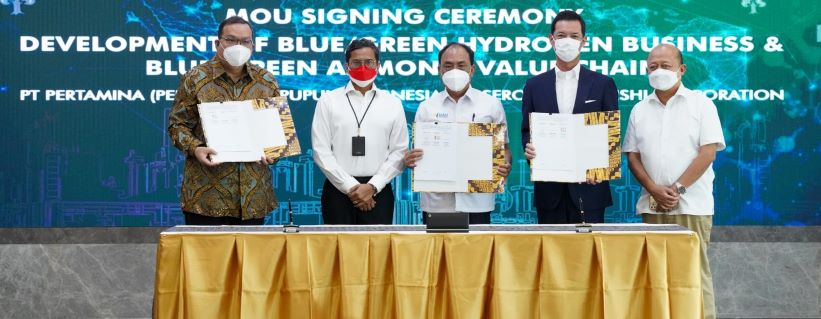Building hydrogen and ammonia value chains in Indonesia
By Julian Atchison on March 25, 2022

Pupuk Indonesia (the country’s state-owned fertiliser manufacturer), Pertamina (Indonesia’s state-owned oil & gas company) and Mitsubishi Corporation will join forces to assess the feasibility of a “Green Hydrogen and Green Ammonia and Carbon Capture Utilization and Storage (CCUS)” supply chain in Indonesia. Currently, Pupuk Indonesia has an ammonia production capacity of over 5 million tonnes per year – nearly 3% of the global total – spread across five sites.
In the announcement, First Deputy Minister of State-Owned Enterprises Pahala Mansury emphasized that the new partnership was geared towards reducing coal utilisation at existing thermal power plants via co-firing with ammonia.
We all know that Mitsubishi is a leading company both as an investor and an ammonia offtaker. Therefore, we really hope that this MoU can soon be realized into something more concrete, not just a study but also project development.
(translated by Google) President Director of Pupuk Indonesia, Bakir Pasaman in the official press release (Indonesian language), 3 March 2022
We have developed the ammonia and biomass co-firing as well as the utilization of carbon capture technology to reduce the usage of coal at power plants…We are very committed to ensuring that Indonesia can reduce greenhouse gas emissions based on its National Determined Contribution (NDC) by 29% by 2030, but we cannot do it alone. We know that to make it happen, the key is partnership.
(translated by Google) Deputy Minister of State-Owned Enterprises Pahala Mansury in the official press release (Indonesian language), 3 March 2022
The decarbonisation of ammonia production in Indonesia started slowly, but is quickly accelerating. In March 2021, a Mitsubishi-led consortium embarked on a CCS ammonia project: the full blue conversion of an existing 660,000 ammonia production plant in Central Sulawesi. After a brief hiatus, two significant decisions have been made offshore in 2022 with direct implications for Indonesian ammonia:
- Japan’s announcement in January this year they would be supporting fellow ASEAN countries to adopt ammonia energy solutions, particularly coal co-firing.
- And Singapore’s sovereign wealth fund making a significant investment in Jakarta’s primary port in February, which included focus on a number of renewable energy generation projects. Singapore and Indonesia also signed a broader decarbonisation pact around the same time the investment was announced.